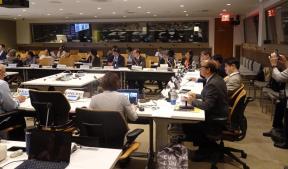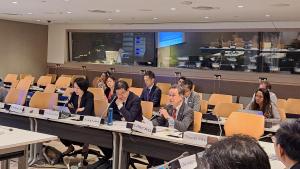The United Nations Centre for Regional Development (UNCRD)-Division for Sustainable Development Goals (DSDG)/United Nations Department of Economic and Social Affairs (UN DESA), the Ministry of Transport of the Government of Malaysia, and the Permanent Mission of Japan to the United Nations co-organized a side event of 2023 High-Level Political Forum (HLPF) on 13 July 2023 at the UN Headquarters with the theme of - “Towards Safe, Smart, Resilient and Sustainable Cities under the 2030 Agenda – Integrated Pathways to Transformation through Local Actions, Partnerships, Technological Interventions, and Infrastructure Development”. The side event which was participated by around fifty participants from twenty-one countries was supported by the UN-Habit, Toyota City, and SEED. The side event which was moderated by C.R.C. Mohanty, UNCRD/DSDG-UN DESA, aimed to address how urban planning and development should progress in a well-planned, integrated, and inclusive manner with city and municipal authorities working together in close collaboration and partnership with private and business sector, civil society organizations, scientific and research communities and national governments towards achieving the SDGs, in particular SDG 11, while ensuring “no one is left behind” in cities. The side event was officially opened by Mr. Zuwang Zhu, Director, DSDG-UN DESA, followed by opening remarks of Mr. Koichiro Matsumoto, Director, Global Issues Cooperation Division of the Ministry of Foreign Affairs of Japan and special video message of H.E. Mr. Loke Siew Fook, Minister of Transport of the Government of Malaysia. Mr. Zhu remarked that policy and investment decisions made today in several areas such as – water and sanitation, healthcare and education, public transport, waste management, energy, infrastructure development, digital connectivity, and land use planning and urban space management, etc. would have profound and long-lasting impact on the quality of life, livability and resilience of the cities. He also emphasized that by embracing nature-based solutions such as preserving and maintaining wetlands and parks and green spaces, cities can enhance their adaptability to climate change and resilience.
Hon. Mayor of Toyota City, Mr. Toshihiko Ota, shared the Net-Zero Carbon Initiatives of Toyota City which includes Net Zero Energy House (ZEH) incentives, Zero Emission Vehicle (ZEH) incentives, smart towns, forests plantation and renewable energy facilities, among others. Toyota City has not only introduced the SDGs certification system for private and business sector but also has conducted voluntary local review (VLR) on SDGs. Introducing the findings of the 2023 SDGs Progress Report, Prof. Norichika Kanie, Graduate School of Media Governance, Keio University, Japan, elaborated on what needs to be done in transforming the cities towards achieving the SDGs. He further explained that under the Sustainable Development Pathway (SDP-1.5℃ Scenario), by 2030 most of the SDGs will have made progress. By 2050 most SDGs are achieved or nearing the target levels, but such issues as air pollution and management of food waste are still lagged behind. He elaborated various levers and entry points for such transformation. While the levers include governance, economy and finance, individual and collective action, science and technology and capacity building, the entry points include human well-being and capabilities, sustainable and just economies, sustainable food systems and healthy nutrition, energy decarbonization with universal access, urban and peri-urban development, and global environmental commons. He concluded that cities should lead the way in integrated planning for SDG implementation across all entry-points, and in disaster risk reduction. Addressing the role of SMEs in leading the future of smart cities, Dr. Arab Hoballah, Executive Director SEED, Former Team Leader, EU SWITCH-Asia, Former Chief of Sustainable Consumption and Production (SCP), UNEP, remarked that no climate targets, no circular economy, no smart, green, sustainable cities would be achieved without duly enabled and empowered SMEs. Addressing the need for balancing nature and urban development in a smart city ecosystem, Mr. André Dzikus, Chief, Urban Basic Services Section, UN-Habitat, remarked that nearly 90 per cent of the urban population increase would be in Africa and Asia, the fastest urbanizing global regions. He emphasized the need for planned city extensions with preservation of public spaces, compact and mixed land use planning, provision of essential services and utilities, public transport interconnectivity and multi-modal integration, among others. He further shared a number of international experiences and examples of nature-based solutions in national urban policy frameworks. Introducing the Japanese cases of local actions and partnerships in basin-wide flood management, Mr. Takahiro Konami, Director, International Affairs Office, Water and Disaster Management Bureau, Ministry of Land, Infrastructure, Transport and Tourism (MLIT), elaborated various policy and structural measures taken by Japan such as the River Basin Disaster Resilience and Sustainability by All which include measures like - flood protection by improving rain water storage functions, storing flowing water through construction, upgrades and effective use of dams, ensuring and improving the discharge capacity of river channels; exposure reduction by providing guidance to residents to lower risk areas, promoting safer ways of living, localize inundation areas; and enhancing disaster resilience by improving land risk information, reinforcing evacuation systems, minimize economic damages, promoting safer ways of living, improving support systems for affected local governments and eliminating inundation promptly, among others. Ms. Yumi Otsuka, Chief Sustainability Officer, Toyota Motor Corporation, presented the Corporation’s various SDGs promotional activities including business contribution to sustainable and smart city development, Toyota City “SAKURA Project”to help power supply in times of disaster, sustainable mobility solutions for cities through Toyota Mobility Foundation, green vehicles and energies, promotion of hydrogen and biomass energy and launching of living laboratory for solving social challenges (woven city project), among others. A brief summary and closing remarks was given by Mr. Kazushige Endo, Director, UNCRD/DSDG-UN DESA.



